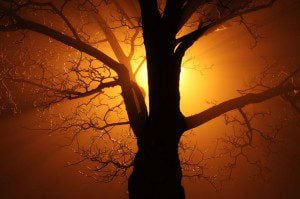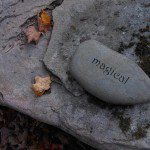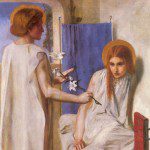Making Light is an occasional column by Hellenic polytheist Sunweaver. Follow her via RSS!
A few years ago, the group I worship with underwent a major transformation. We all realized we weren’t Wiccan and that following the Wiccan wheel of the year was a bit ridiculous for us. We did a radical thing and gave ourselves permission to celebrate those holidays and observances that were meaningful to us over a system that didn’t ping our collective feeling of communing with the divine. Culturally, that’s not easy for a Judeo-Hellenic-Christo-Roman group with a smidge of California Buddhism whose members were all trained as Wiccan clergy and whose regional community was mainly comprised of old-school Wiccans. There are only four of us and it doesn’t break down neatly into one Jew-Witch, one Hellenic, one Christo-pagan, and one Roman. It’s more complicated than that. We each connect with the divine in ways that can be defined by some or all of these terms and you wouldn’t think this is a combo that works very well, but it does. It makes holidays really interesting.
The first thing we did was to evaluate whether or not any of the Wiccan holidays worked for us. We kept Beltaine and Samhain more or less intact, but the first to go was Imbolc. It just didn’t do it for us and never had. The Superbowl was more meaningful to us than Imbolc and I’m not just being flippant here. Watching the Superbowl is as much a ritual as any, even if there’s no formalized cast a circle, light the candles, call the quarters thing. I could even make a theological argument along Romano-Hellenic lines about sacred contests, but I won’t get into it just now. Needless to say, it’s part of our “wheel of the year,” if you will. It’s important.
There is certainly a thing that happens at this time of year, but it took us a while to find the best way to observe that thing or even to identify what that thing is. Somewhere between the winter solstice and the spring equinox, we notice that the days have gotten longer. They’ve been getting longer this whole time, but you don’t really notice until late January/early February. At this time, we start moving toward warmer days, even though we haven’t really had any yet. Because the light and temperature are beginning to increase, it’s as good a place as any to mark the end of Hyperborea and Apollo’s return to the Temple.
This also happens to be  in the Jewish calendar, the new year of the trees. One of the major draws to Paganism for me is the environmental aspect, reverence for the earth, stewardship, responsible use of resources, all that jazz. So, why not celebrate? Our group’s propensity to include Jewish celebrations is something of an anomaly in our local community. By now, there’s not only acceptance of this fact, but active encouragement. Good food opens minds faster than anything– let me tell you about honey and apples and the best challah in all of Middle Tennessee. But it wasn’t always that way. We fought both the presiding subculture that “Pagan” means “something that looks like Wicca” and the desire to shoehorn what was meaningful to us into a Wiccan framework. It wasn’t until we quit fighting it that we discovered the joys of other holidays. We let go, ignored the shocked gasps of our colleagues, and poked things like Tu B’Shvat with a stick. There were no actual fights, but some of us had significant internal struggles and that’s no small thing.
in the Jewish calendar, the new year of the trees. One of the major draws to Paganism for me is the environmental aspect, reverence for the earth, stewardship, responsible use of resources, all that jazz. So, why not celebrate? Our group’s propensity to include Jewish celebrations is something of an anomaly in our local community. By now, there’s not only acceptance of this fact, but active encouragement. Good food opens minds faster than anything– let me tell you about honey and apples and the best challah in all of Middle Tennessee. But it wasn’t always that way. We fought both the presiding subculture that “Pagan” means “something that looks like Wicca” and the desire to shoehorn what was meaningful to us into a Wiccan framework. It wasn’t until we quit fighting it that we discovered the joys of other holidays. We let go, ignored the shocked gasps of our colleagues, and poked things like Tu B’Shvat with a stick. There were no actual fights, but some of us had significant internal struggles and that’s no small thing.
At Tu B’Shvat, we eat the fruit of the Earth, drink wine, and talk about how trees are essential to our well-being. We also drink four glasses of wine: a glass of red, one that’s red with a little white, then white with a little red, and a glass of white. Traditionally, you drink your wine the other way around, from white to red, but we like to shake things up and it seemed to make more sense to us this way. The idea is that we’re moving from the earthly to the heavenly, the celestial, the pure. This reflects the movement from the Dionysian time of year to the Apollonian. Rather than aiming to copy or mimic what a practicing Jew would do, we analyze, tweak, and alter the rituals for our own purposes. We like to say that these rituals are Jewish. We don’t adhere to a strict interpretation of them any more than we would try to reproduce something the ancient Greeks did.
The wine’s the thing that really ties it into the end of Hyperborea and the return of the light for me. It’s like Dionysos’ last hurrah before big brother comes home and he has to clean up the empty wine bottles and shoo the nymphs away. This isn’t what the ancients did for Hyperborea, either. In fact, I have no idea what, if anything, they did to mark the occasion and it’s not important anyway, except to satisfy intellectual curiosity. The important thing is that we’ve carried the light through the darkest parts of the year, we’ve started to wake the trees, and we’re waiting for the first blooms of the year. There are ways in which Imbolc does this for some people, but in order for us to reach that connection with the divine and to strengthen it, we had to find something else that spoke truer to us. Between Tu B’Shvat, the end of Hyperborea, and the Superbowl, we feel like our wheel has turned (as it were).













